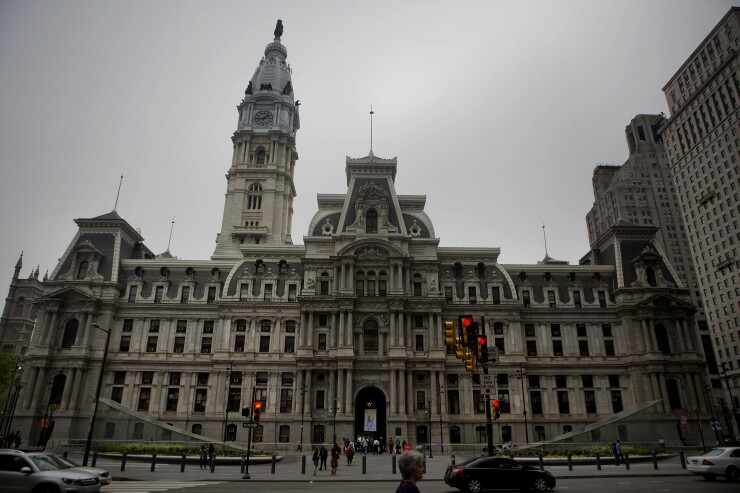Philadelphia hired underwriters for Tuesday's $190 million general obligation bond deal that it is suing in for alleged collusion on previously issued variable-rate debt.
Pennsylvania’s largest city

One of the six, Barclays PLC, is leading the GO sale as senior manager. Wells Fargo & Co., which was also included in the lawsuit, was tapped as co-manager for the series 2019A bond deal.
“As we noted back in February when the suit was filed, the city has not cut business ties with those institutions,” Mike Dunn, a spokesman for Philadelphia Mayor Jim Kenney, said in a statement. “In this instance, we have decided to use both banks as managers for the upcoming general obligation bond because the selection committee felt that both firms provided thoughtful credit and marketing ideas when responding to the Request for Information associated with the transaction.”
Barclays and Wells Fargo both declined comment.
Philadelphia's lawsuit came amid others filed by the whistleblower behind Edelweiss Fund LLC, with similar allegations that banks
The whistleblower has been identified as Bjorn Johan Rosenberg, a registered municipal advisor in Minnesota.
The other financial institutions included in the Philadelphia lawsuit were Bank of America, Citigroup, Goldman Sachs, JPMorgan Chase and RBC.
Municipal Market Analytics partner Matt Fabian said there isn’t much of a track record with issuers working on bond deals with banks amid pending lawsuits since it is unusual for localities to file suit against financial institutions. He said it wasn’t a surprise that Philadelphia chose to still work with Barclays and Wells Fargo because of the limited options available.
“The municipal community is highly dependent on a handful of major broker-dealers so it’s difficult to avoid one of these institutions,” Fabian said. “If a broker-dealer is offering a lower price it’s hard for a city to pay a higher price just to avoid them.”
Philadelphia will be issuing GOs for the first time since Citi priced a $331.6 million 2017 sale. S&P Global Ratings
Proceeds from Tuesday’s sale will go toward providing for a matched-maturity tax-exempt current refunding of the city's Series 2009A bonds. The city had $3.95 billion of tax-supported debt outstanding as of June 30, 2018, according to Moody’s.





